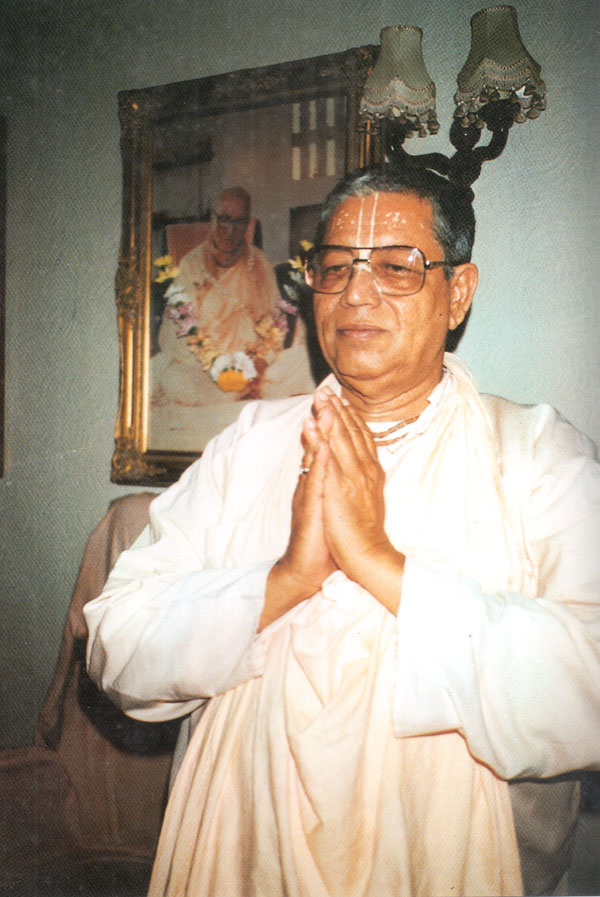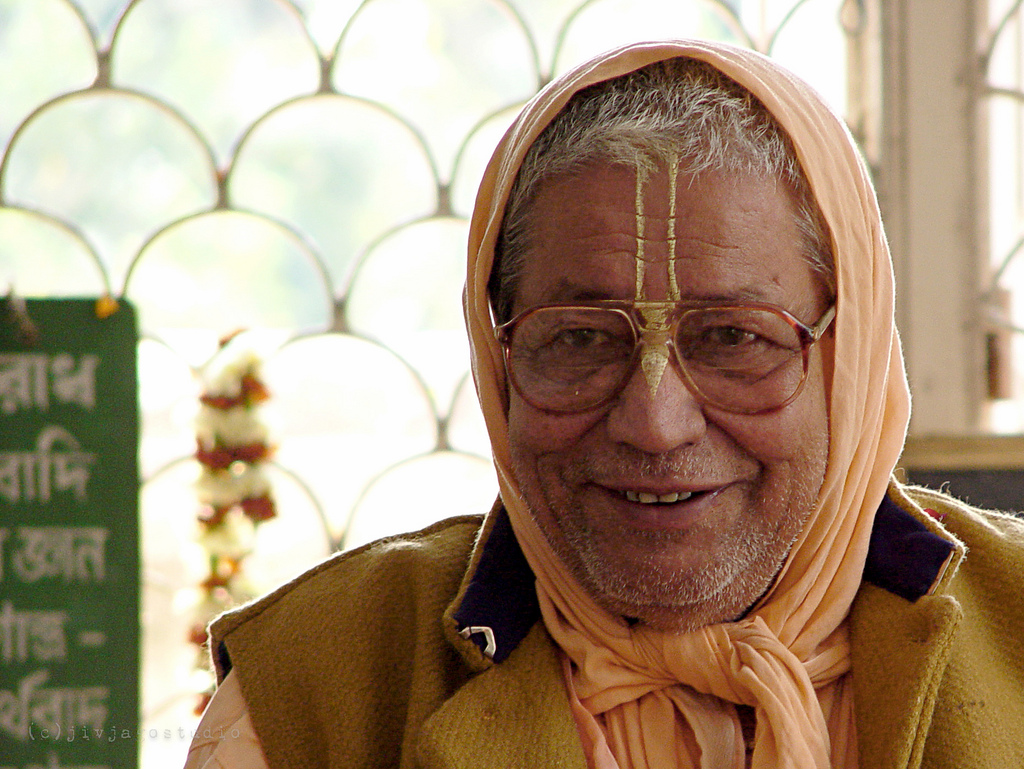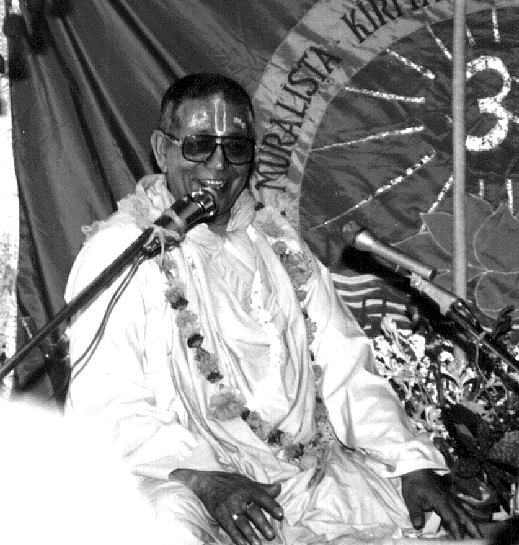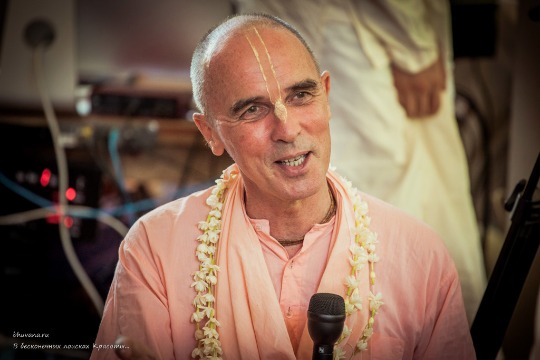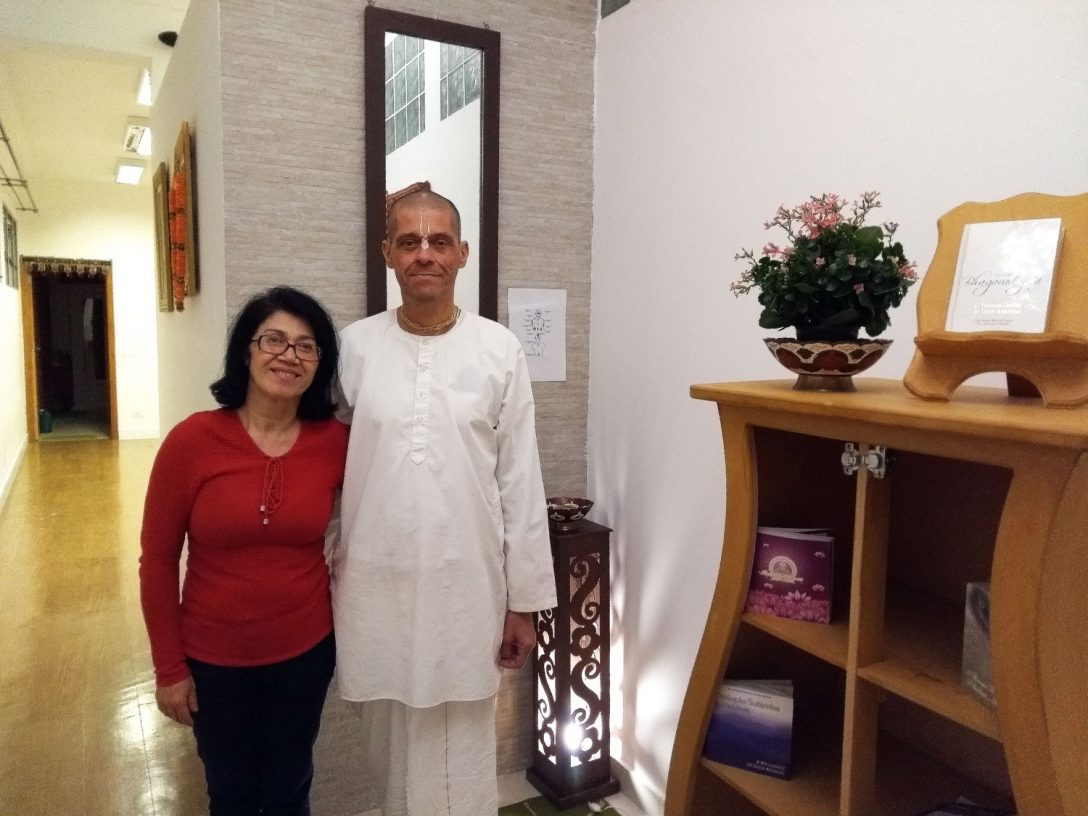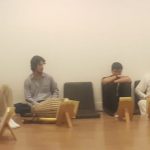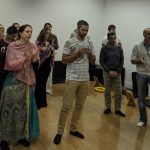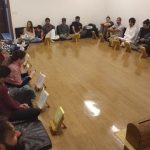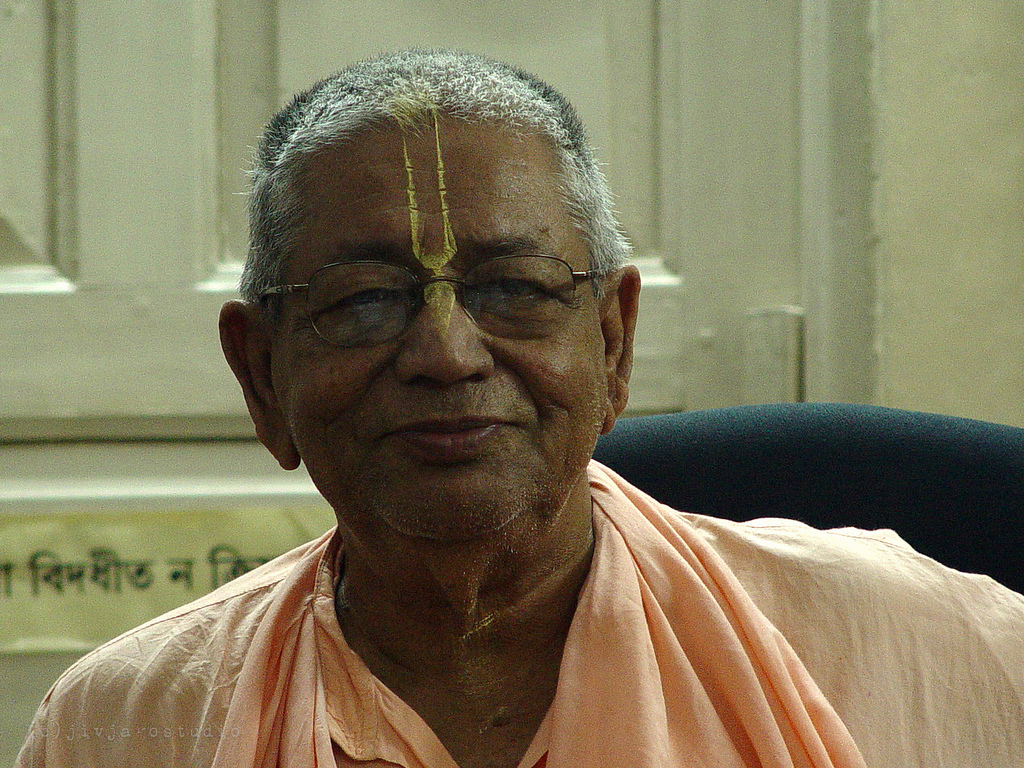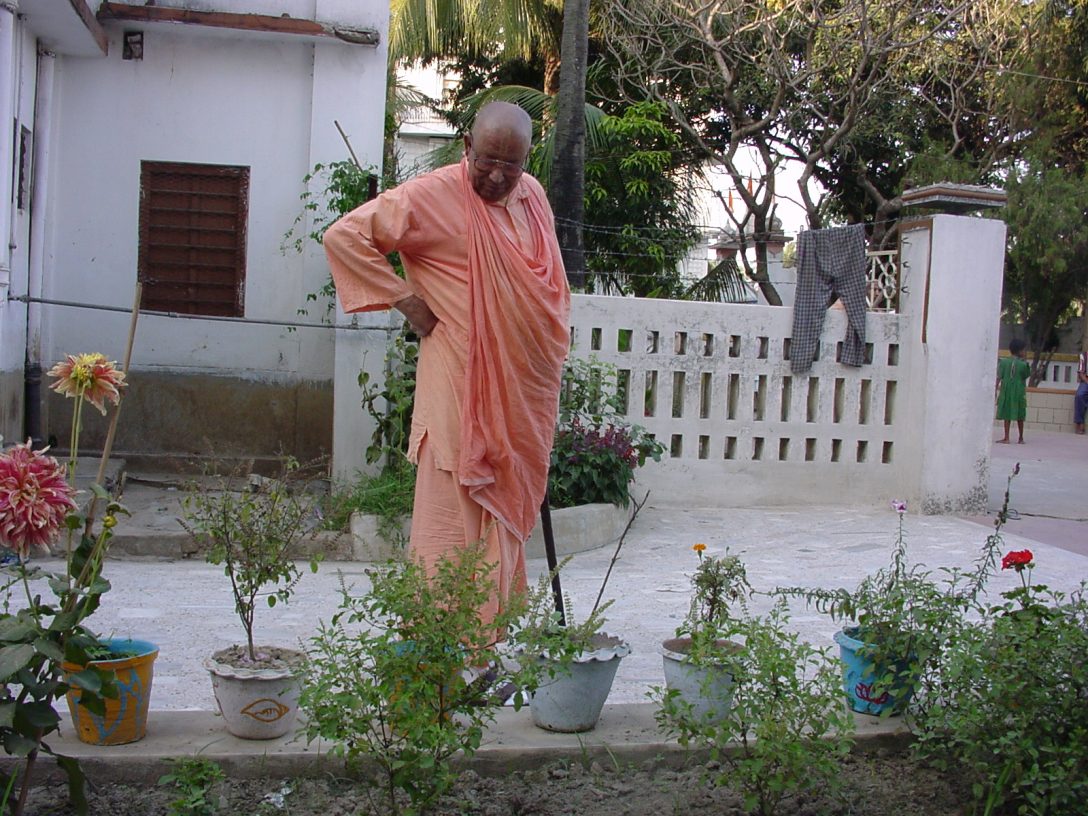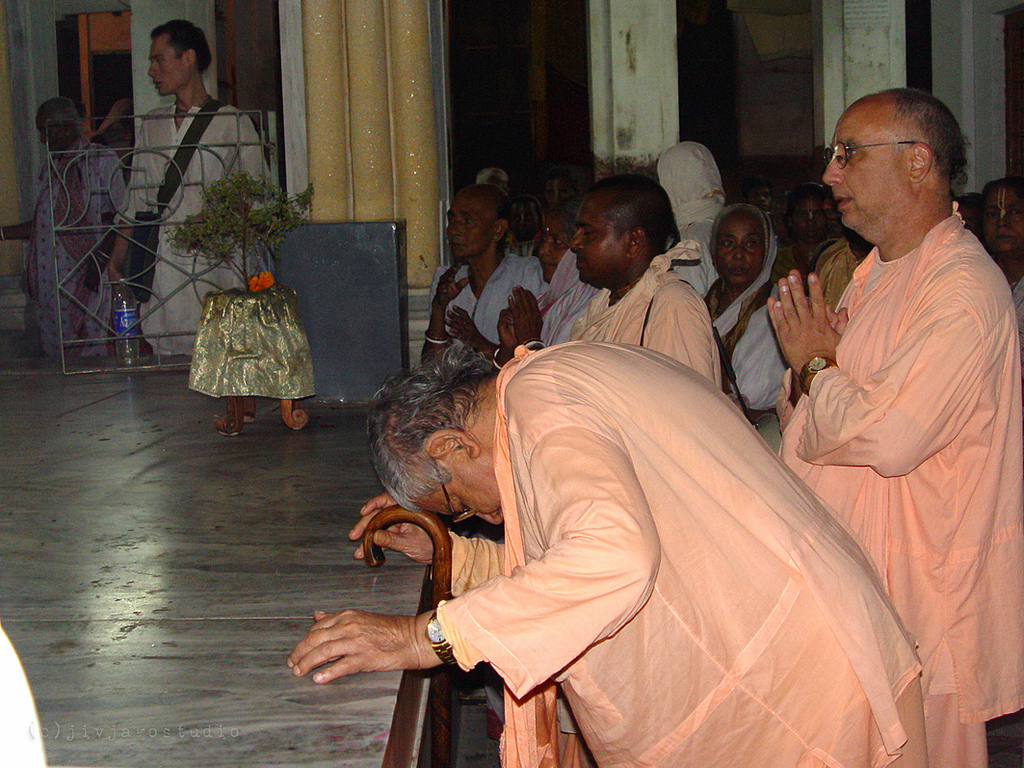His Divine Grace speaking on the day before Srila Bhakti Raksak Sridhar Dev-Goswami Maharaj’s appearance day in 1988, just a few months after his departure from this world.
dhyāyech chhrī-guru-pāda-padma-nikaṭe sevotsukañ chātmanaḥ
I am ever-ready to carry out the order of Srila Guru Maharaj. This is my position. This is my dhyan, meditation. What meditation shall we do before worship? This type of meditation. My svarup, my form, is very nice: with a clean and pure heart I am always waiting beside Srila Gurudev for his order. This is my svarup.
vimalatāṁ nityaṁ vahantīṁ tanuṁ
dhyāyech chhrī-guru-pāda-padma-nikaṭe sevotsukañ chātmanaḥ
এইভাবেতে সেবা করার বিধি শাস্ত্র এইটা বলেছেন । [In this way the scriptures have stated the rule for engaging in service.] In this way we can worship the Deities or do anything ordered by our Sri Gurudev.
Tomorrow is a very auspicious day. We have come here from so far for worshipping our beloved Srila Guru Maharaj. It is necessary to make ourselves ready in this way: “I can do everything for my Gurudev; I am ever-ready to carry out whatever order he may give.” This mentality gives us our destiny.
এ রকম মনোভাবই আমাদেরকে ভগবানের সেবার দিকে টেনে নিয়ে যেতে পারে । নিজের ধ্যানটা ভূতশুদ্ধিটা সেইটি হচ্ছে গিয়ে সর্ব্বাগ্রে দারকার । এই ভূতশুদ্ধি করতে গেলে যে preparation-এর দারকার হয় সে preparation আমাদের গুরু মহারাজ পরম কৃপা করে প্রথম থেকে আমাদেরকে জানিয়ে দিয়েচ্ছেন । সেইটা কি ? সেইটা হচ্ছে গিয়ে first preparation হচ্ছে গিয়ে শরণাগতি: surrendering mood, not challenging mood । আমরা গুরু মহারাজকে সাক্ষাৎ ভাবেতে যেটা দেখি সেটা কিন্তু তাঁর শুদ্ধ স্বরূপ আমরা অনুভব করতে পারি মুখে বলে যতই বলে না কেন যে,
[This type of mentality can lead us to the Lord’s service. Self-meditation, self-purification (bhuta-suddhi), is first of all necessary. Our Guru Maharaj most mercifully taught us from the beginning the preparation that is necessary when we go to perform such self-purification. What is that? That first preparation is saranagati, the mood of surrender, and not the mood of challenge. What we see directly of our Guru Maharaj is him, but we cannot perceive his pure form, regardless of whatever we may say or not.]
sākṣād-dharitvena samasta-śāstrair
uktas tathā bhāvyata eva sadbhiḥ
kintu prabhor yaḥ priya eva tasya
vande guroḥ śrī-charaṇāravindam
Bhagavan Himself has come very mercifully in this world in the form of my Gurudev. If I can take this conception closely in my heart, then I must be satisfied and successful.
Tomorrow we want to worship our Guru Maharaj, but for that we must peform bhuta-suddhi (self-purification), and then we can properly worship our Guru Maharaj. How is it possible? By the grace of Guru Maharaj, we have got so many books, we have got so many instructions from our Guru Maharaj’s tapes, and we have the living source of Guru Maharaj, the devotees who are always engaged twenty-four hours a day worshipping according to Guru Maharaj’s order. We can have some association, and we can understand and properly worship our Guru Maharaj in this way.
Srila Guru Maharaj wants to offer us to his worshippable beloved Gurudev, and in that way everything goes to the service of Sri Sri Radha-Krishna. But if we cannot maintain saranagati properly, then we also cannot worship Sri Gurudev properly. In the Gaudiya sampradaya we can see the highest example of saranagati, the surrendering mood. Before Mahaprabhu, we can also find the proper saranagati mood in the Ramanuja sampradaya. We can see that saranagati is very exalted there, and our Guru Maharaj quoted many slokas of the Acharyas of the Ramanuja sampradaya, like Yamuna Acharya and Kulasekhar Acharya, in the Prapanna-jivanamrtam scripture. Srila Thakur Bhakti Vinod also included their expressions about saranagati in his songs.
In Srimad Bhagavad-gita (18.66), Bhagavan Sri Krishna has glorified saranagati and given us super hope with the verse,
sarva-dharmān parityajya mām ekaṁ śaraṇaṁ vraja
[“Abandon all duties and surrender to Me.”]
And also,
yat karoṣi yad aśnāsi yaj juhoṣi dadāsi yat
yat tapasyasi kaunteya tat kuruṣva mad-arpaṇam
(Śrīmad Bhagavad-gītā: 9.27)
[“Whatever you do, whatever you eat, whatever you sacrifice, whatever you give away, and whatever austerity you perform, do that as an offering to Me.”]
Saranagati is the highest thing in our life. Guru Maharaj always told us, “If you can surrender yourself properly, you must get the feelings and seva of your worshippable Deities. Then it is necessary to think today that we must make some preparation for worshipping our Guru Maharaj, and we can do that by being ready to carry out his order. The only thing that he wants is the spreading of Krishna consciousness all over the world. We can also attain our auspicious fortune if we try to fulfil his order and serve him through his paraphernalia present here in Nabadwip Dham, Koladwip. We must be the gainer.
When Guru Maharaj was present, the final result of all the service in the Math would come to me. The devotees would report something had happened, and Guru Maharaj would think, “Govinda Maharaj has done it.” When I would express that I had not done it, but it was done by Hari Charan Prabhu, or Krishna Saran Prabhu, or another devotee, Guru Maharaj would say, “Oh yes, yes, you have done it!”
In this way I was sometimes very fortunate, and sometimes I was very unhappy. Another devotee did so much, but the pratishtha, the fame, would come to me. At that time I could not understand that Guru Maharaj had one line, and he wanted everything to go through me: “If Govinda Maharaj said it is okay, then it is okay.” If any devotee wanted to start something, Guru Maharaj would tell them, “Ask Govinda Maharaj.”
In this way Srila Guru Maharaj gave me an opportunity to do some seva, but at that time I was not fully conscious because I felt that Guru Maharaj was doing everything and we were his instruments. Now a heavy duty has come to us; we cannot say anything wrong now. At that time everything we said was right; everything belongs to Krishna, and everything was going to Guru Maharaj, and he would manage everything. He was my caretaker and everyone’s caretaker.
We had no fear at that time, but now we must be very conscious about our position in our transcendental Krishna conscious practising life. This is necessary, and we think that it is for this reason that Guru Maharaj disappeared. If Guru Maharaj is always present in front of us, then we are always depending on Guru Maharaj. Now Guru Maharaj wants to hiddenly see our activities. This is the thinking that has come to me now. Guru Maharaj gave me some charge, and he wants to see what I am doing now, and what is my progress report. This is not only for myself, but it is for everybody. He wants to know what our progress report is. He is hiddenly waiting.
If we can see Guru Maharaj properly, then we can see that he is present everywhere, in the form of his devotees, in form of his disciples, in form of his paraphernalia, and also in the form of my disciples. In this way he is looking to see how my progress report is going. This is the feeling coming to us in the absence of Guru Maharaj, and I think that it is a very correct and good symptom.
Good symptoms must come to us. It is very hopeful. Guru Maharaj was always in Krishna consciousness and Krishna Himself came for our benefit in the form of Guru Maharaj, but his whole life he practised Krishna consciousness in order to teach us. Then, when we were not fully conscious, he disappeared, and he wants to see what we learned from him. He left many things for our practising of Krishna consciousness. One thing is enough for us, but he has done many things for our devotional life. It is necessary to go forward very consciously now.
Guru Maharaj is always with us. When I was feeling very great separation from Guru Maharaj, the news came that the London Math was in some trouble. The London Math was Guru Maharaj’s Math: he did not claim any Math, but his Guru Maharaj ordered him to preach in London, so when an opportunity came for a centre in London, he thought, “This is my place; something must be there in my name.” In this way he felt, “The London Math in my Math.” Then when some difficulty came there, my mind was diverted from feelings of separation to the London Math. I could understand that this was Guru Maharaj’s policy: when I was feeling the deepest separation, I could not do anything and was only thinking, “Guru Maharaj is not here, Guru Maharaj is not here!” At that time Guru Maharaj said, “Guru Maharaj is not here? Guru Maharaj is always with you all. You think for seva.” Then Guru Maharaj created that seva. If we have this vision, then we can see everything as the mercy of our Guru Maharaj.
Guru Maharaj has given so many engagements to us. We are trying to fulfil his desire in Chaitanya Saraswat Math, in the Kolkata Math, in the Hapaniya Math, in the Puri Math, and now he has given us another duty for his Union in Separation Temple, his Samadhi Mandir. In this way Guru Maharaj is trying to develop our faith, and our transcendental thinking and practising life. He wants it to grow, and it must grow in this way. We are so fortunate if we can see the mercy of our Guru Maharaj in this way.
We have puppy brains: our nature is that we begin practising Krishna consciousness very fast, and then immediately come back and go in another direction. This is the position of our minds. From that position Guru Maharaj wants to take us for his seva and for our destiny, and for that reason he has given us his separation; but through his paraphernalia, through his Deity, through his disciples, and through his godbrothers, we can always feel union with him. If we try to see properly, then we can see this by the grace of our Guru Maharaj.
vāñchha-kalpa-tarubhyaś cha kṛpā-sindhubhya eva cha
patitānāṁ pāvanebhyo vaiṣṇavebhyo namo namaḥ
Note
Spoken on 31 October 1988.
Reference
divyaṁ śrī-hari-mandirāḍhya-tilakaṁ kaṇṭhaṁ sumālānvitaṁ
vakṣaḥ śrī-hari-nāma-varṇa-subhagaṁ śrī-khaṇḍa-liptaṁ punaḥ
pūtaṁ sūkṣma-navāmbaraṁ vimalatāṁ nityaṁ vahantīṁ tanuṁ
dhyāyech chhrī-guru-pāda-padma-nikaṭe sevotsukañ chātmanaḥ
“Meditate that the Lord’s Temple (your body) is decorated with shining tilak, your neck bears a beautiful tulasī-mālā, your chest is adorned with the Names of Śrī Hari and sandalwood paste, you are wearing fine, new, clean cloth, and in your pure, eternal form, you are at the lotus feet of Śrī Guru, eager for service.”

